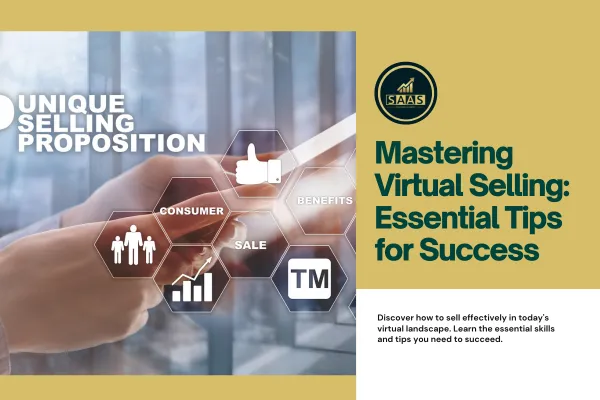Exciting Insights and Tips on Digital Marketing, Sales, Hustle Life, Customer Service, and Upcoming AI

Mastering Virtual Selling: Essential Skills and Tips for Success

The Increasing Prevalence of Remote Work in the Sales Industry and the Benefits of Virtual Selling
In recent years, remote work has become increasingly prevalent in various industries, and the sales industry is no exception. With advancements in technology and the changing landscape of business, more and more sales professionals are embracing virtual selling as a way to connect with clients and close deals. This article explores the rise of remote work in sales and highlights the benefits of virtual selling.
One of the key advantages of virtual selling is the ability to reach a wider audience. Sales professionals are no longer limited by geographical boundaries and can connect with clients from all over the world. This opens up new opportunities for growth and expansion, as sales teams can tap into previously untapped markets and build relationships with clients they may not have been able to reach otherwise.
Additionally, virtual selling allows for increased flexibility and efficiency. Sales professionals can conduct meetings and presentations from the comfort of their own homes or offices, eliminating the need for travel and reducing costs. This not only saves time and money but also allows for more frequent and productive interactions with clients.
However, virtual selling also presents its own set of challenges. Building relationships and delivering compelling value propositions in a virtual setting requires specific skills that may not be as crucial in traditional face-to-face sales. Sales professionals need to adapt and develop new strategies to effectively engage with clients and stand out in a virtual environment.
One of the key skills for virtual selling is the ability to effectively use technology. Sales professionals must be comfortable with video conferencing tools, pre-recorded sales videos, email communication, and social selling platforms. These tools are essential for connecting with clients and delivering impactful presentations. Additionally, strong communication skills are crucial in virtual selling, as sales professionals must be able to convey their message clearly and effectively without the benefit of in-person interaction.
Furthermore, relationship-building is a vital skill in virtual selling. Sales professionals must find ways to establish trust and rapport with clients, even without the opportunity for face-to-face meetings. This requires creativity and adaptability in finding ways to connect and engage with clients on a personal level.
Lastly, staying motivated is essential in virtual selling. Without the structure and accountability of a traditional office environment, sales professionals must be self-disciplined and proactive in managing their time and energy. They must find ways to stay motivated and focused, even when faced with the challenges of remote work.
In conclusion, the rise of remote work in the sales industry has led to the increasing prevalence of virtual selling. While virtual selling offers numerous benefits, it also requires sales professionals to develop specific skills to effectively build relationships and deliver compelling value propositions in a virtual setting. In the following sections, we will explore these essential skills in more detail and provide practical tips for excelling at virtual selling.

Essential Skills for Virtual Selling
In today's increasingly digital world, sales professionals must possess a unique set of skills to excel in virtual selling. These skills go beyond traditional sales techniques and require a deep understanding of technology, effective communication, relationship-building, and self-motivation.
First and foremost, being comfortable using technology is crucial for virtual selling success. Sales professionals must familiarize themselves with video conferencing tools, such as Zoom or Microsoft Teams, to conduct virtual meetings and presentations. Additionally, pre-recorded sales videos can be a powerful tool for delivering consistent and compelling messages to prospects. Email communication also plays a significant role in virtual selling, so being proficient in crafting clear and persuasive emails is essential.
Strong communication skills are another key aspect of virtual selling. Without the ability to read body language or gauge facial expressions, sales professionals must rely on their verbal communication skills to convey their message effectively. Clear and concise communication is vital to ensure that prospects understand the value proposition and benefits of the product or service being offered.
Building relationships virtually can be challenging, but it is crucial for success in virtual selling. Sales professionals must find creative ways to establish rapport and trust with prospects without the benefit of face-to-face interactions. This can be achieved through active listening, asking thoughtful questions, and showing genuine interest in the prospect's needs and challenges.
Staying motivated is also a critical skill for virtual selling. Working remotely can sometimes lead to feelings of isolation or lack of accountability. Sales professionals must be self-driven and disciplined to stay focused on their goals and maintain a high level of productivity. Setting daily or weekly targets, creating a structured work schedule, and finding ways to stay connected with colleagues can help maintain motivation and drive success in virtual selling.
In conclusion, virtual selling requires a unique skill set that goes beyond traditional sales techniques. Sales professionals must be comfortable using technology, possess strong communication skills, excel at building relationships virtually, and stay motivated in a remote work environment. By developing and honing these essential skills, sales professionals can thrive in the virtual selling landscape and achieve their sales goals.

Practical Tips for Excelling at Virtual Selling
In order to excel at virtual selling, sales professionals need to employ specific strategies and techniques that are tailored to the virtual environment. Here are some practical tips to help sales professionals succeed in virtual selling:
1. Thoroughly research prospects: Before engaging with a prospect in a virtual setting, it is crucial to conduct thorough research. This includes understanding their industry, their specific needs and pain points, and any recent news or developments that may impact their business. By demonstrating a deep understanding of the prospect's business, sales professionals can establish credibility and build trust.
2. Help buyers feel comfortable: Virtual interactions can sometimes feel impersonal, so it is important to make buyers feel at ease. Begin by introducing yourself and explaining the purpose of the meeting or call. Take the time to establish a personal connection by asking about their day or any recent events. Creating a friendly and relaxed atmosphere will help build rapport and make the buyer more receptive to the sales pitch.
3. Show the virtual sales process: Many buyers may be unfamiliar with the virtual sales process, so it is important to provide a clear roadmap of what to expect. Explain how the virtual sales process will unfold, including the different stages, the duration of each stage, and any necessary actions from the buyer. This will help set expectations and alleviate any concerns the buyer may have about the virtual sales experience.
4. Vary communication methods: To keep prospects engaged and interested, it is important to vary the communication methods used during the virtual sales process. This can include using video conferencing tools for face-to-face interactions, sending pre-recorded sales videos to provide additional information, and utilizing email communication for follow-ups and sharing relevant resources. By using a mix of communication methods, sales professionals can cater to different preferences and keep the prospect engaged throughout the sales process.
5. Leverage high-powered visuals: In a virtual setting, visuals play a crucial role in capturing the attention and interest of prospects. Utilize high-powered visuals such as compelling slides, product demonstrations, and interactive presentations to enhance the sales process. Visuals not only make the sales pitch more engaging but also help prospects better understand the value proposition being offered.
By following these practical tips, sales professionals can excel at virtual selling and effectively build relationships and deliver compelling value propositions in a virtual setting. These strategies will help sales professionals stand out in a competitive virtual sales landscape and achieve success in their remote work endeavors.

The Importance of Being Prepared for Challenges in Virtual Selling
Virtual selling, like any other sales channel, comes with its own set of challenges. It is crucial for sales professionals to be prepared for these challenges and have strategies in place to overcome them. This section will highlight some key challenges in virtual selling and provide tips on how to address them effectively.
One of the main challenges in virtual selling is the lack of face-to-face interaction. Building trust and rapport with prospects can be more difficult when you are not physically present. To overcome this challenge, it is important to gather as much information as possible about your prospects before engaging with them. Research their background, interests, and pain points so that you can tailor your approach and demonstrate that you understand their needs.
Another challenge is helping buyers feel comfortable in virtual interactions. Some prospects may be unfamiliar or uncomfortable with virtual meetings. To address this, it is important to create a welcoming and professional virtual environment. Make sure your video conferencing tools are set up properly, dress appropriately, and have a clean and organized background. Additionally, take the time to explain the virtual sales process to your prospects and address any concerns or questions they may have. By setting clear expectations and alleviating any anxieties, you can help buyers feel more at ease.
Setting expectations is crucial in virtual selling. Prospects may have concerns about the virtual sales process, such as the security of their information or the effectiveness of virtual demonstrations. To address these concerns, it is recommended to share a roadmap of the virtual sales process with prospects. This can include details on how meetings will be conducted, what information will be shared, and how decisions will be made. By providing a clear outline of the process, you can ease any concerns and build trust with your prospects.
In conclusion, being prepared for challenges is essential in virtual selling. By gathering information about prospects, helping buyers feel comfortable, and setting expectations, sales professionals can overcome the unique obstacles of virtual selling. It is important to remember that virtual selling is still a relatively new sales channel, and it may require iteration and refinement of strategies. By staying adaptable and continuously improving, sales professionals can create a seamless virtual sales process and achieve success in the remote work era.

The final section underscores the need for flexibility and adaptability in the virtual sales process. While virtual selling has become increasingly prevalent in the sales industry, it is still a relatively new sales channel. As such, sales professionals must be prepared to iterate and refine their approach as needed.
One of the key advantages of virtual selling is the ability to adapt to changing circumstances. Sales professionals should be open to experimenting with different strategies and techniques to find what works best for them and their prospects. This may involve trying out new communication methods, exploring different ways to engage prospects, or utilizing innovative tools and technologies.
Continuous learning and improvement are crucial in creating a seamless virtual sales process. Sales professionals should stay updated on the latest trends and best practices in virtual selling. This can be done through attending webinars, reading industry publications, and participating in online forums and communities. By staying informed, sales professionals can stay ahead of the curve and continuously enhance their virtual selling skills.
Additionally, feedback from prospects and colleagues can provide valuable insights for improvement. Sales professionals should actively seek feedback from prospects after virtual interactions to understand what worked well and what could be improved. They can also collaborate with colleagues to share experiences and learn from each other's successes and challenges.
In conclusion, flexibility and adaptability are essential in the virtual sales process. Sales professionals must be willing to embrace change, experiment with different strategies, and continuously learn and improve. By doing so, they can create a seamless virtual sales experience that effectively builds relationships and delivers compelling value propositions to prospects.

© 2025 SaaS Coaching Academy | All Rights Reserved | All Sales Are Final No Refunds | Privacy Policy | Terms of Service | Contact Us
info@leadstoroi.com
541-270-3477

